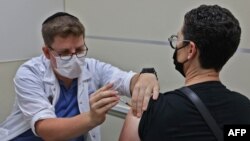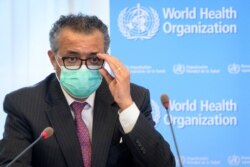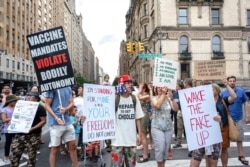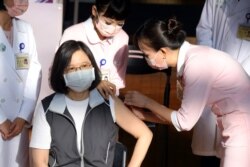The head of the World Health Organization urged countries to delay administering booster shots by at least two months to allow nations with low vaccine doses to receive more.
WHO Director-General Tedros Adhanom Ghebreyesus told reporters during a visit to Hungary's capital, Budapest, that priority should be given to raising vaccination rates in countries where only 1% or 2% of the population has been inoculated.
Tedros also questioned the usefulness of booster shots, saying "there is a debate about whether booster shots are effective at all."
Hungary became the first country in the European Union to offer booster shots and joins a growing number of nations, including the United States and Israel, that have begun offering or are planning to offer third shots to their populations.
The WHO said last week that it does not believe current data supports the need for COVID-19 booster shots.
In the United States, more localities and organizations said Monday they will require proof of vaccination following the announcement that Pfizer's coronavirus vaccine received full federal approval.
Louisiana officials said civil servants would be required to get vaccinated or face regular testing while universities in the state said they would begin mandating vaccinations for students.
The Pentagon said Monday it is preparing to issue guidance to require vaccinations now that the Pfizer vaccine has been given full approval. The Defense Department had previously said the vaccines would be mandatory by mid-September or immediately upon approval by the FDA.
New York City officials said Monday all public school staff, including teachers, must be vaccinated and will no longer have the option to undergo weekly coronavirus testing instead of being inoculated.
Elsewhere around the world, India sent 140 tons of liquid medical oxygen to neighboring Sri Lanka, where the delta variant of COVID-19 is fueling a surge in cases.
On Monday, Taiwan's President Tsai Ing-wen received the first dose of the island's controversial, domestically produced coronavirus vaccine.
The island's medical and scientific communities have expressed concerns about the vaccine produced by Taipei-based Medigen Vaccine Biologics Corporation because regulators did not give emergency approval.
Instead of using the results from long-term studies of the vaccine through rounds of clinical trials, regulators opted to compare the level of antibodies the Medigen vaccine produced against the antibodies produced by the AstraZeneca vaccine.
Several governments have approved the AstraZeneca vaccine, which has endured the extensive round of clinical trials usually associated with a vaccine's approval.
Medigen has a year to submit efficacy data about the vaccine.
In New Zealand, Prime Minister Jacinda Ardern said Monday that the nationwide lockdown, imposed to slow the spread of the delta variant of the COVID-19 virus, will be extended until at least Friday. It had been set to end Tuesday.
The lockdown extension "will allow us to have additional data and see if the virus has spread," Ardern said.
Ardern's announcement came after the country's health department announced 35 new COVID-19 cases of the delta strain, bringing the total number of the country's coronavirus cases since last week to 107.
Most of the cases have emerged in Auckland. Ardern said the lockdown there will continue to the end of the month.
"We don't want to take any risks with delta," the prime minister said.
Also Monday, China's health department said it had no new locally transmitted cases of COVID-19 to report for the first time since July.
China imposed restrictions nationwide after several airport workers in Nanjing were identified in July as having the highly contagious delta variant of the coronavirus.
Some information for this report came from The Associated Press, Agence France-Presse and Reuters.








